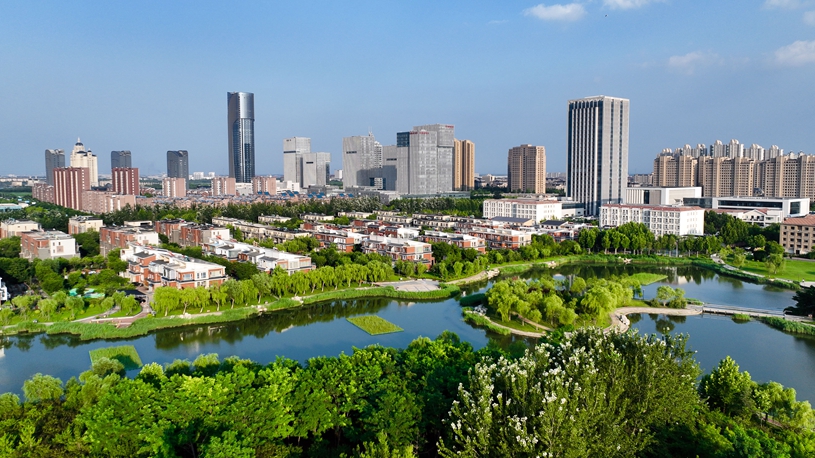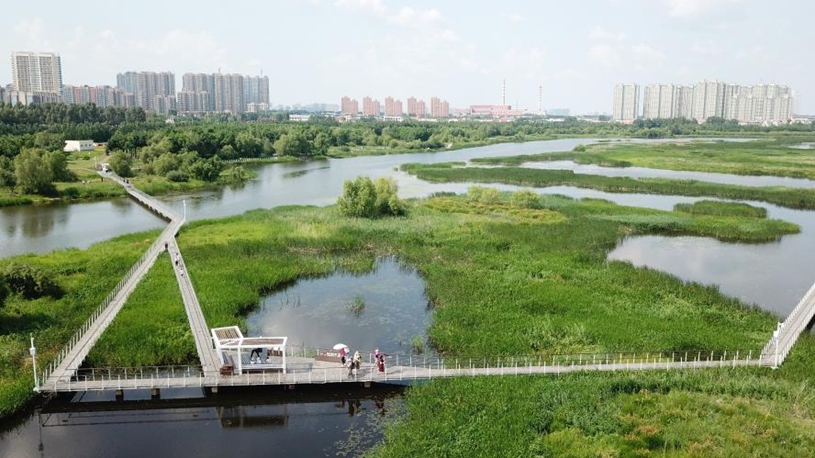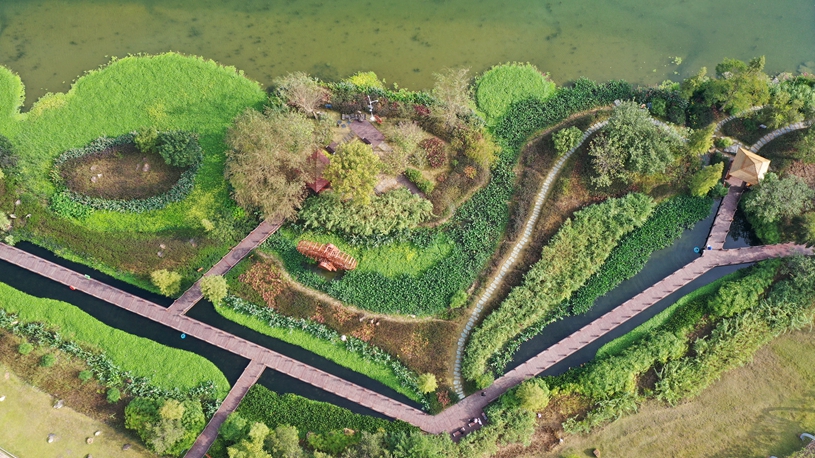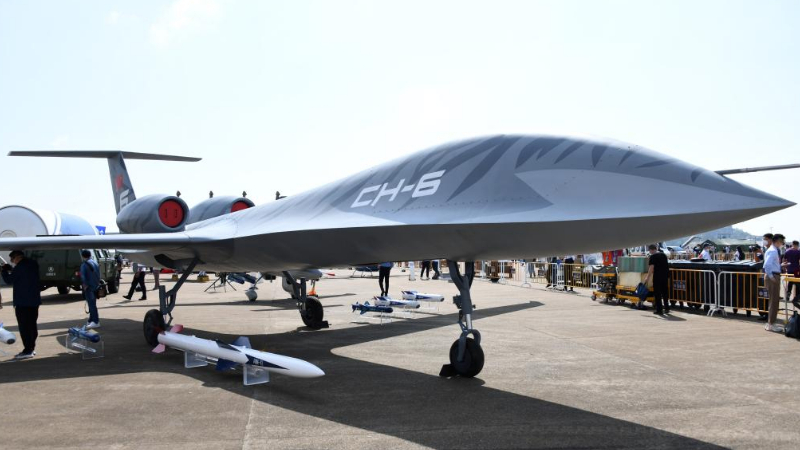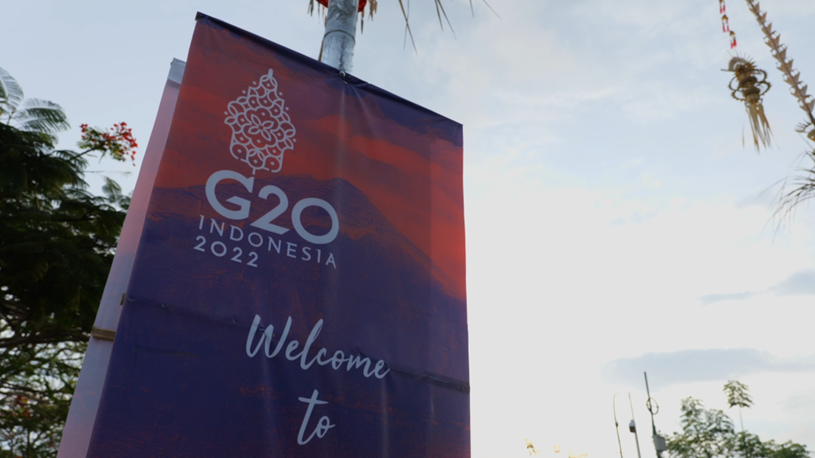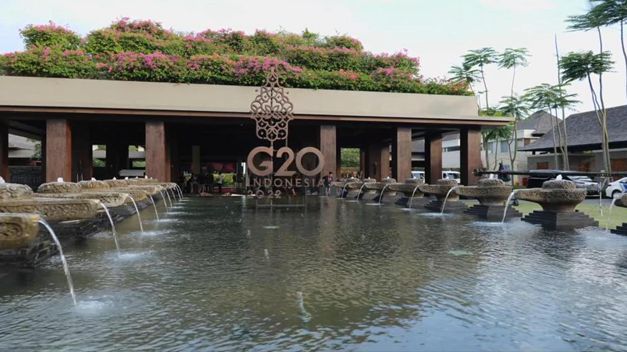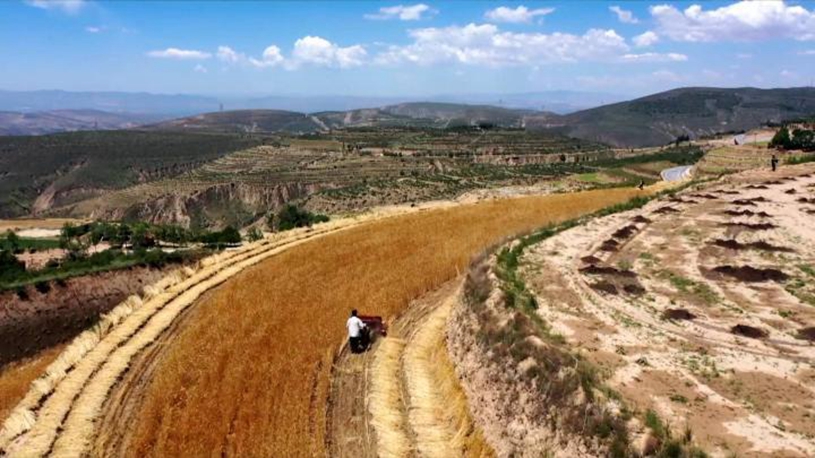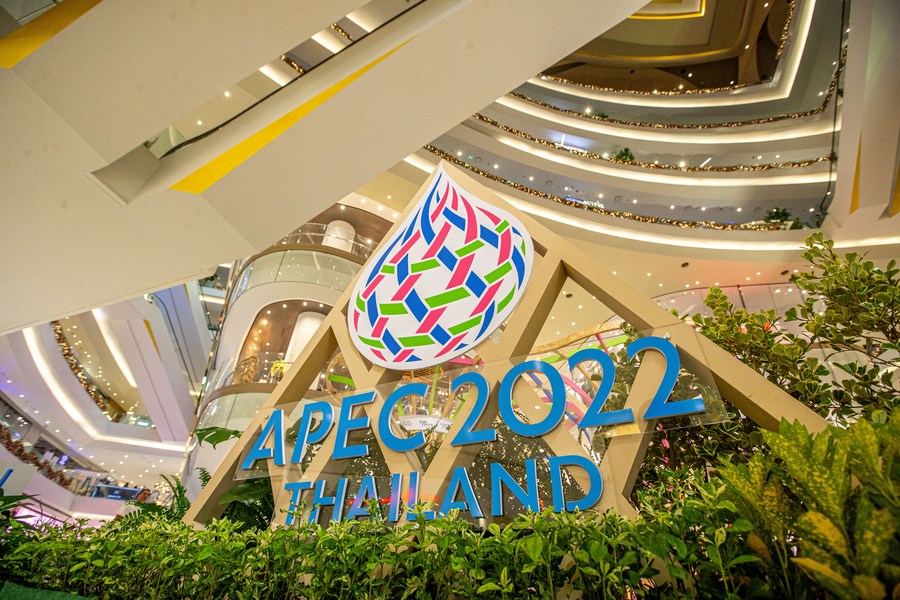
A logo of APEC 2022 is pictured in Bangkok, Thailand, Nov. 16, 2022. The 29th Asia-Pacific Economic Cooperation (APEC) Economic Leaders' Meeting will be held in Bangkok, Thailand, on Nov. 18-19. (Xinhua/Wang Teng)
* Observers said the APEC economies should step up efforts towards further economic integration, including lowering trade and investment barriers, jointly cope with risks arising from COVID-19, high inflation and climate change, and provide impetus for the region and the world to develop sustainably.
* Home to 2.9 billion people, or nearly 40 percent of the world population, the 21 APEC economies account for about half of global trade and over 60 percent of the world's total gross domestic product (GDP).
* While the APEC economies are looking at moves to reboot economic growth, they're trying to ensure a green, sustainable and resilient recovery.
BANGKOK, Nov. 16 (Xinhua) -- Bangkok is in the limelight with leaders of the 21 Pacific Rim economies gathering for their first in-person meeting since 2018 to seek solutions to pressing challenges and spur sustainable and inclusive growth across the region and beyond.
The 29th Asia-Pacific Economic Cooperation (APEC) Economic Leaders' Meeting will be hosted on Friday and Saturday under the theme of "Open, Connect, Balance."
The world is sailing into strong headwinds as the fragile global economic recovery is relentlessly battered by persistent inflation, skyrocketing energy and food prices, as well as heightened geopolitical tensions, exacerbated by widespread climate change fallouts and a once-in-a-century pandemic.
Observers said the APEC economies should step up efforts towards further economic integration, including lowering trade and investment barriers, jointly cope with risks arising from COVID-19, high inflation and climate change, and provide impetus for the region and the world to develop sustainably.
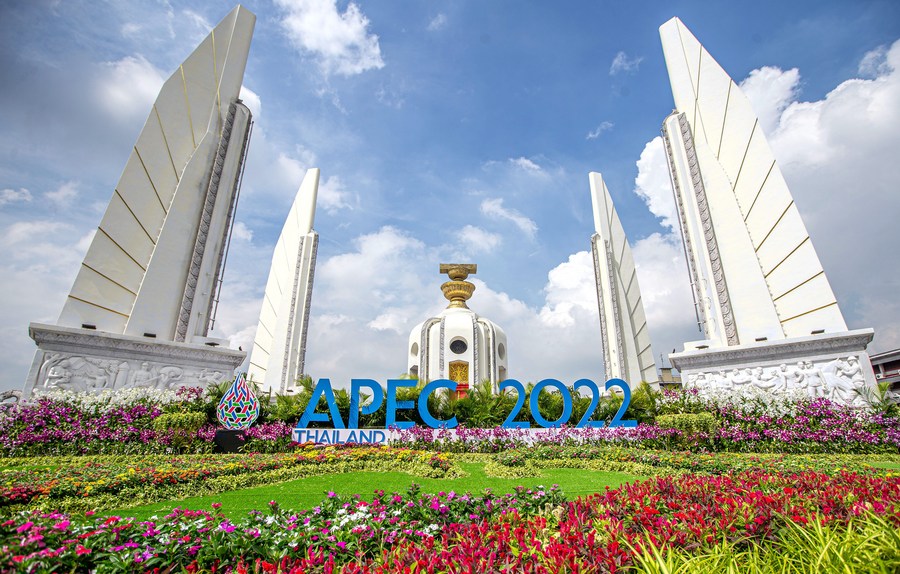
A logo of APEC 2022 is pictured on a street in Bangkok, Thailand, Nov. 16, 2022. The 29th Asia-Pacific Economic Cooperation (APEC) Economic Leaders' Meeting will be held in Bangkok, Thailand, on Nov. 18-19. (Xinhua/Wang Teng)
OPEN COOPERATION AGAINST HEADWINDS
In the latest Regional Economic Outlook Report for Asia and Pacific, the International Monetary Fund (IMF) lowered its growth forecasts for the Asia-Pacific region to 4 percent this year and 4.3 percent next year, by 0.9 and 0.8 percentage points, respectively, from its April forecasts.
Despite the growth cut, Asia remains a relatively bright spot in an increasingly dimming global economy, said Krishna Srinivasan, director of the IMF's Asia and Pacific Department.
Home to 2.9 billion people, or nearly 40 percent of the world population, the 21 APEC economies account for about half of global trade and over 60 percent of the world's total gross domestic product (GDP). "If the 21 economies are connected to one another and cooperate, it will unleash big power," APEC Business Advisory Council (ABAC) Chairman Kriengkrai Thiennukul told Xinhua.
The region hatched the Regional Comprehensive Economic Partnership (RCEP), the world's largest free trade deal that took effect on Jan. 1 this year, delivering tangible dividends to the Asia-Pacific and its people by cutting tariffs and removing non-tariff barriers.
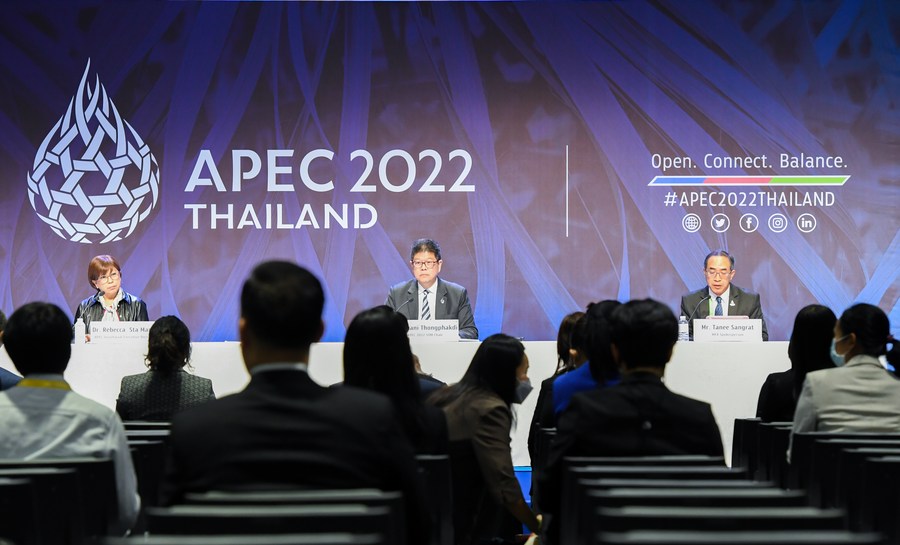
This photo taken on Nov. 16, 2022 shows a press conference after the Asia-Pacific Economic Cooperation (APEC) Senior Officials' Meeting in Bangkok, Thailand. TO GO WITH "APEC senior officials' meeting focuses on common interests, aspirations" (Xinhua/Guo Lei)
According to a report released at the RCEP Media & Think Tank Forum in May last year, the 15-country RCEP is expected to help its members boost exports, foreign investment stocks and GDP by 10.4 percent, 2.6 percent and 1.8 percent respectively by 2025. Another estimate by the Peterson Institute for International Economics (PIIE) suggested it could add 186 billion U.S. dollars of national income annually by 2030.
However, the region is also facing urgent challenges including the pandemic, geopolitical tensions, high inflation, food insecurity and climate change. Kriengkrai said APEC economies should avoid political interference, and stay committed to openness, inclusiveness, free trade and connectivity.
Another focus of the upcoming rendezvous will be on refreshing the conversation on the Free Trade Area of the Asia-Pacific (FTAAP), which Thani Thongphakdi, Thailand's permanent secretary for foreign affairs and APEC 2022 Senior Officials' Meeting chair, said "has the potential to deliver significant benefits for our member economies."

A staff member interacts with a robot at the media center of APEC 2022 in Bangkok, Thailand, Nov. 14, 2022. (Xinhua/Wang Teng)
GREEN GROWTH, SUSTAINABLE RECOVERY
While the APEC economies are looking at moves to reboot economic growth, they're trying to ensure a green, sustainable and resilient recovery.
Before the pandemic struck, there was already pressure on economies to decarbonize in response to climate change. "That pressure is even greater now, and that is why in economic recovery from the pandemic, governments are prioritizing 'sustainable recovery' and 'green development,'" said Craig Emerson, director of the Australian APEC Study Center at RMIT University.
It is disturbingly noteworthy that the consequences of climate change are witnessed not only in vulnerable island nations. From devastating floods in Pakistan, severe heatwaves in southern Europe to sweeping hurricanes in the United States, many places on the globe have felt the pinch of climate-related disasters.
Thus Thailand, as the host of the 29th APEC Economic Leaders' Meeting, has been advocating its Bio-Circular-Green (BCG) economy model and working on an outcome document, the Bangkok Goals on BCG Economy, at this year's meeting for a sustainable planet.
"Its completion and endorsement will set APEC on a growth trajectory towards a strong, balanced, sustainable, inclusive and resilient future," said Thani.
Climate change, as a global issue, cannot be plausibly addressed by any individual party, thus more concerted efforts are needed. As long as the Asia-Pacific economies stay united and focus on their shared vision of building an open, dynamic, resilient and peaceful community, they can join the rest of the world to confidently navigate through turbulence.
CHINA'S CONTRIBUTIONS TO APEC
Since joining APEC 31 years ago, China has been firmly committed to regional partnerships and free trade and investment, making significant contributions to a multilateral trading system and an open world economy.
China, which was among the first to ratify the RCEP agreement last year, is also seeking to join the Comprehensive and Progressive Agreement for Trans-Pacific Partnership (CPTPP) and the Digital Economy Partnership Agreement (DEPA) for further regional economic integration. Both the RCEP and CPTPP are believed to be viable pathways toward the wider FTAAP, which the 21 APEC members aim to establish.
Echoing the theme of "Open, Connect, Balance" for the 2022 APEC, China has promised a high-standard opening up with the fifth China International Import Expo in Shanghai yielding great results earlier this month. Tentative deals with a total worth of 73.5 billion U.S. dollars were reached during the import-themed event, a testament to China's gigantic market and numerous business opportunities.
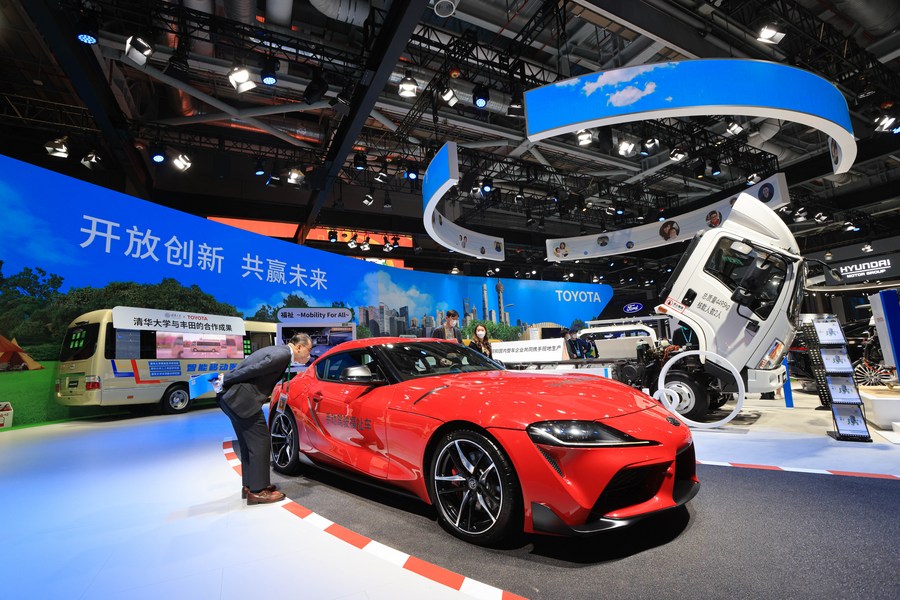
A visitor looks at a car at the booth of Toyota at the fifth China International Import Expo (CIIE) in east China's Shanghai, Nov. 6, 2022. (Xinhua/Li Jing)
The pandemic, geopolitical risks and climate change have triggered a world food shortage and pushed more people in the South into poverty, said Koh King Kee, president of the Center for New Inclusive Asia, a Malaysian think tank.
China's success in eliminating abject poverty has won admiration and praise from global leaders, said Koh, adding that China's experiences in poverty reduction are valuable for the developing world.
Koh noted that China, as a country that has succeeded in eliminating abject poverty and proven itself a leader in renewable energy, should make good use of these multilateral platforms in sharing its lessons, experiences and expertise in these fields with other members.
China can share its green technology to promote green development and help other developing countries' transition to clean energy, which will be a great contribution to global efforts in mitigating climate change, he said.
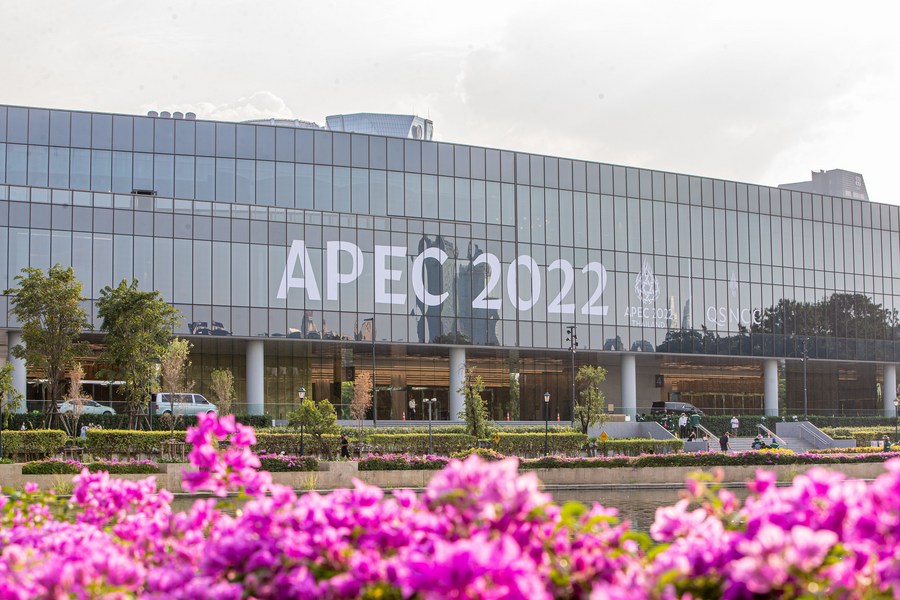
This photo taken on Nov. 12, 2022 shows the Queen Sirikit National Convention Center in Bangkok, Thailand. (Xinhua/Wang Teng)
"We believe that China has a big say in how we move forward the BCG economy agenda," said Cherdchai Chaivaivid, director general of the Department of International Economic Affairs of the Ministry of Foreign Affairs of Thailand.
"With the size of China's economy, the country can make a real difference to the growth in the Asia-Pacific. The role of China in driving regional economic integration is so vital. I want to re-emphasize the need for China to basically lead the process in the Asia-Pacific and in the global market as well," he said.■

